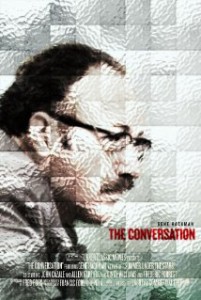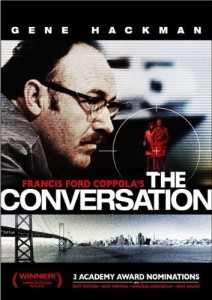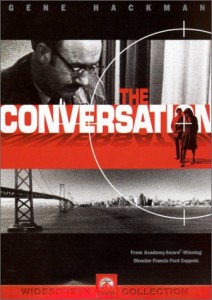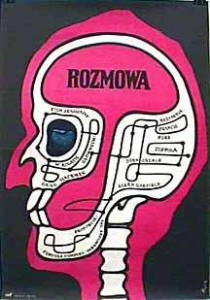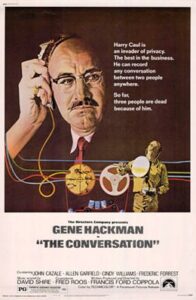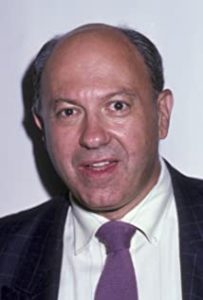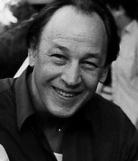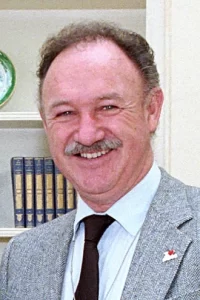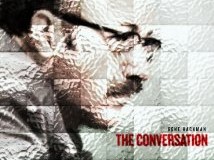The Conversation ***** (1974, Gene Hackman, John Cazale, Allen Garfield, Frederic Forrest, Robert Duvall, Cindy Williams, Teri Garr, Harrison Ford) – Classic Movie Review 3,189
Francis Coppola’s tense and suspenseful 1974 thriller film The Conversation won the Cannes Film Festival Palme d’Or. It’s a tour-de-force for director Coppola and star Gene Hackman as a paranoid surveillance expert.
Francis Ford Coppola’s mesmerisingly tense and suspenseful 1974 mystery thriller film The Conversation was the Palme d’Or winner as best film at the Cannes Film Festival and it received three nominations at the 47th Academy Awards, though the Academy preferred Coppola’s The Godfather Part II.
The Conversation is a tour-de-force for producer-writer-director Coppola and his star Gene Hackman as Harry Caul, a paranoid, guilt-ridden, devout Catholic electronic surveillance bugging expert, who faces a moral dilemma when his recordings reveal a potential murder.
Jazz record lover and saxophone player Caul owns and operates his own San Francisco-based surveillance business, and his latest job with associate Stan (John Cazale) is to record the private discussion of a young couple meeting in the city’s crowded and noisy Union Square.
The agreement with his client, ‘The Director’ (Robert Duvall), is to give him the audio recording of that discussion, but Caul has a crisis of conscience about the uses for the sound tape he records on the investigation when he suspects that the couple he is spying on will be murdered.
It is dazzlingly made by Coppola, working with an intelligent, probing, unsettling screenplay also by Coppola. Its only problem is, despite a fascinating story owing something to the 1966 film Blow-Up (the relentless piecing together of the information on tape) and to Alfred Hitchcock with the gripping Hitchcock-style climax, it is so dark and cerebral that it largely fails to deliver the neo noir thriller genre thrills.
Instead, it is a compulsively low-key, steadily building and absorbing study in paranoia and alienation, almost a horror movie.
It was Oscar nominated for Best Motion Picture – Drama, Best Original Screenplay and Best Sound (Walter Murch, Art Rochester), but there were no wins, and no Golden Globes either. It was the year of The Godfather Part II.
The cast are Gene Hackman as Harry Caul, John Cazale as Stan, Allen Garfield as Bernie Moran, Robert Duvall as The Director, Cindy Williams as Ann, Frederic Forrest as Mark, Harrison Ford as Martin Stett, Michael Higgins as Paul, Elizabeth MacRae as Meredith, Teri Garr as Amy Fredericks, Phoebe Alexander as Lurleen, Mark Wheeler as Receptionist, and Robert Shields as The Mime.
Principal photography took place from November 27, 1972 to late February 1973. Paramount Pictures released it in cinemas on 7 April 1974. Reviews were great but the box office was not. It grossed $4.4 million on a $1.6 million budget. Some of its audiences found it a bit baffling or over-intellectual.
Four key personnel are as follows. Walter Murch is the supervising editor and sound designer with largely a free hand in editing process as Coppola was working on The Godfather Part II. The music is by David Shire, the composer and performer of the film’s piano score, created before the film was shot. The production design is by Dean Tavoularis. The director of photography is Bill Butler.
It was selected for preservation in the US National Film Registry in 1995 by the Library of Congress as being culturally, historically, or aesthetically significant.
It was recorded in Mono sound but it is now in Dolby Digital in the restored version.
Coppola noted that he was shocked to discover that his film used the same surveillance and wire-tapping equipment that Nixon Administration members used to spy on political opponents before the Watergate scandal. He said this is why the film gained part of its recognition but that is entirely coincidental.
His script was completed in the mid-1960s and the spying equipment in the film came from research and technical advisers, and not from newspaper stories about the Watergate break-in. Apparently, Coppola had seen Blow-Up a year or so before he wrote his script, and had the idea to use its concept in the world of audio surveillance. He has named it a key influence on his film’s themes of surveillance versus participation, and perception versus reality.
Harry Caul was inspired by surveillance technology expert Martin Kaiser, technical consultant on the film. He is also based on Harry Haller in Herman Hesse’s novel Steppenwolf, a total cypher who lives alone in a boarding house. Coppola recalled Hackman found it difficult to play his character because he was so different from himself.
The director of photography is Bill Butler, along with an uncredited Haskell Wexler, who died on December 27 2015, aged 93. Apparently, Wexler was fired and replaced by Butler because of severe creative and personal differences. The two went on to share the Oscar nomination for Best Cinematography for One Flew Over the Cuckoo’s Nest (1975) when he completed the production after Wexler was fired. Butler shot The Rain People (1969) for Francis Ford Coppola and did uncredited 2nd Unit Photography on Coppola‘s 1972 film The Godfather.
Wexler’s footage on The Conversation was completely reshot, apart from the complex surveillance scene in Union Square.
It is both Coppola’s and Hackman’s favourite of their own movies. Hackman learned to play the saxophone for the film.
RIP Allen Garfield [Allen Goorwitz], Beverly Hills Cop II, Nashville and The Conversation star, who died on 7aged 80.
RIP American cinematographer Bill Butler (April 7, 1921 – April 5, 2023), perhaps best known for his work on The Conversation (1974), Jaws (1975), and three Rocky sequels: Rocky II, Rocky III, and Rocky IV. He worked till Evil Angel in 2009. He turned 100 on April 7, 2021 and died in Los Angeles two days before his 102nd birthday.
Frederic Forrest (December 23, 1936 – June 23, 2023) earned a nomination for the Golden Globe Award for Most Promising Newcomer in When the Legends Die (1972) and received Academy and Golden Globe Award nominations as Best Supporting Actor for The Rose (1979).
He collaborated with Francis Ford Coppola on The Conversation (1974), Apocalypse Now (1979), One from the Heart (1982), Hammett (1982), and Tucker: The Man and His Dream (1988).
Eugene Allen Hackman (January 30, 1930 – February 2025)
© Derek Winnert 2015 Classic Movie Review 3,189
Check out more reviews on http://derekwinnert.com

